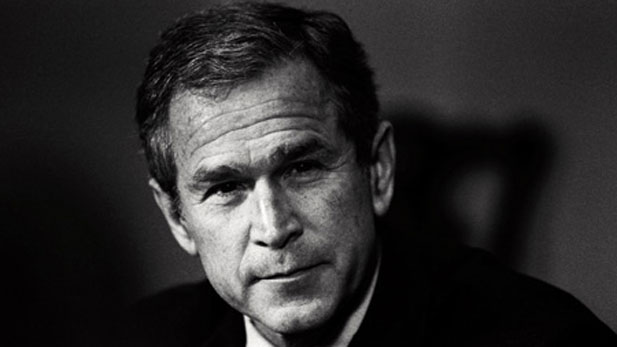
9/11 and Al Qaeda, Afghanistan and Iraq, WMD and the Insurgency, Guantanamo, Abu Ghraib, Fallujah and the Surge. For six years, FRONTLINE has been revealing those stories in meticulous detail, and the political dramas played out at the highest levels — George W. Bush and Tony Blair, Dick Cheney and Colin Powell, Donald Rumsfeld, George Tenet, Condoleezza Rice, Osama Bin Laden.
Now, the full saga will unfold in a special broadcast titled Bush's War.
Drawing on one of the richest archives in broadcast journalism veteran producer Michael Kirk also delivers new reporting and fresh interviews. Bush’s War is the definitive documentary analysis of one of the most challenging periods in the nation’s history.
On one side, Secretary of State Colin Powell and Director of Central Intelligence George Tenet squared off against Vice President Dick Cheney and his longtime ally, Secretary of Defense Donald Rumsfeld. The battles were over policy — whether to attack Iraq; the role of Iraqi exile Ahmad Chalabi; how to treat detainees; whether to seek United Nations resolutions; and the value of intelligence suggesting a connection between Saddam Hussein and the 9/11 attacks — but the conflict was deeply personal.
“Friendships were dashed,” Powell’s deputy Richard Armitage tells FRONTLINE. As the war within the administration heated up, Armitage and Powell concluded that they were being shut out of key decisions by Cheney and Rumsfeld. “The battle of ideas, you generally come up with the best solution. When somebody hijacks the system, then, just like a hijacked airplane, very often no good comes of it,” Armitage adds.
Others inside the administration believe they understand the motivation behind some of the vice president’s actions. “I think the vice president felt he kind of looked death in the eye on 9/11,” former White House counterterrorism coordinator Richard Clarke says. “Three thousand Americans died. The building that the vice president used to work in blew up, and people died there. This was a cold slap in the face. This is a different world you’re living in now. And the enemy’s still out there, and the enemy could come after you. That does cause you to think [about] things differently.”
Find out more about FRONTLINE Bush's War.
Watch it Friday, August 1st at 8:30pm on viewer supported KUAT6

By submitting your comments, you hereby give AZPM the right to post your comments and potentially use them in any other form of media operated by this institution.